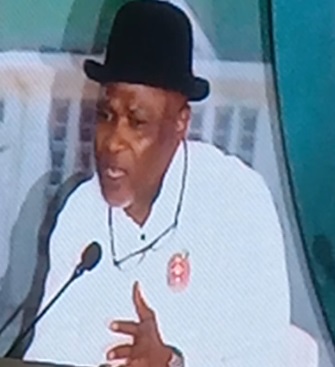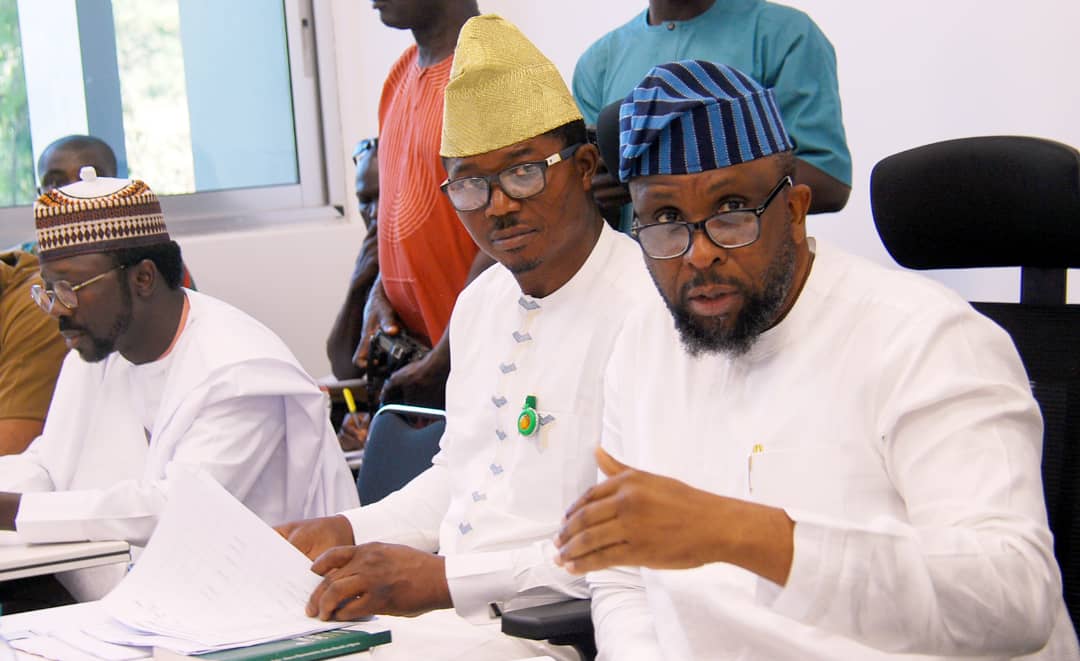News
WATCH how HoR Minority Caucus leader, Chinda analysed why Nig needs to shift from presidential to home grown Parliamentary system

By Chukwuka Kanu
The Dialogue to ensure Nigerians savour its own home grown Parliamentary System entered a different level on Monday as dignitaries from all walks of life espoused different views on the subject matter at the Shehu Yar’Dua International Conference Centre, Abuja.
Panelist of men of substance from egg heads to former governors, speakers, serving lawmakers all gathered to find a common solution to governance shift that would adopt Nigeria’s peculiarities and take Nigerians to the promised land.
To this end, at the National Dialogue on a Home Grown Parliamentary System of Government, a co-convener and HoR Minority Caucus leader Kingsley Chinda as one of panelists gave a breakdown on the way forward.
Hear him:
“I think that restates the cliche by Alexander Pope referred to by His Excellency that for every form of government they must contend for whatever is best administered.
“But I think it’s not just those who administer the system, you must also have a system that is administrable in your own circumstances.
“And that is why today if you ask, some persons might even say that Nigerians are inherently corrupt but that is not the case.
He stressed further: “When we started we were not like this, so you ask the question where did we get it wrong?
“The only thing that we have seen is that the system we imported, the laws we have so much loopholes and it makes it comfortable for us public office holders to do things that we get away with easily.
“The former speaker talked about the issue of impeachment, removing a councillor under our present law is almost an impossibility and so the councillor knows, I’m not talking about members of the National Assembly, I’m not talking about the executive, the councillor at the ward level because you have to get majority signatures of voters and that will be confirmed by INEC, how do you do that? When even the voters register had more than 50% ghost names, so where are you going to get the 50% genuine persons and their signatures confirmed?
“So this system has inherent loopholes that will allow those who are administering it to go scot-free and we need to tighten it.
“Another reason why we say so is that the same Nigerian who takes pride in beating the traffic light, who takes pride with even the NEPA at home you would want to do a bypass, send that same person to Ghana, I’m not talking about the United States, send him to Ghana and there is a queue somewhere, he will line up quietly because he knows that the system is not the same thing he had at home.
” So some people talk about mindset change, yes you might think about mindset change but to me the person sitting behind, the children behind are the people that require a mindset change because we already know that what we are doing is wrong and when we go to a clime where they have a better and stronger system we behave ourselves, so what mind are you going to change?
“We need to change the system, we need to begin to provide stronger penalty for those who commit crime.
“I remembered once either in the 8th or 7th Assembly we proposed a bill for death penalty for public office holders that steal public funds, it did not see the light of day.
” I think that we should begin to take extreme measures that will discourage public office holders from doing the things that they do.
“And the current presidential system we practice is one that allows a lot of leverage, there are so many things that are morally wrong but legally they are right under our laws and so it becomes difficult to hold anybody culpable even where people criticise over such actions.
“And for us to move on, we must begin to look at our own peculiar attitudes and couch laws that will take care of them, that is the homegrown.
“Homegrown is not that we look at our culture, tradition and all that, no. What are Nigerians likely to do if you give them this opportunity.
“Let me use discretion, if you bring a public office holder in Europe and bring a Nigerian public office holder and ask them to exercise discretion on an issue, I’m sure that you will agree that the Nigerian public office holder will be looking at religion, tribe whilst taking that matter.
Watch video below:
THE END
News
See Photos of World’s Tallest and Shortest Women Meet for Afternoon Tea in London

The world’s tallest woman and the world’s shortest woman met for the first time this week, sipping tea from china cups — and bonding over what they have in common while celebrating their differences.

Jyoti Amge, shortest woman, and Rumeysa Gelgi, tallest woman, meet for the first time and share afternoon tea
Jyoti Amge, shortest woman, and Rumeysa Gelgi, tallest woman, meet for the first time and share afternoon tea

Jyoti Amge, shortest woman, and Rumeysa Gelgi, tallest woman, meet for the first time and share afternoon tea
Rumeysa Gelgi, from Turkey, stands at 7 feet and 0.7 inches, while Jyoti Amge, from India, is 2 feet and 0.7 inches.
Jyoti Amge, shortest woman, and Rumeysa Gelgi, tallest woman, meet for the first time and share afternoon tea

Jyoti Amge, shortest woman, and Rumeysa Gelgi, tallest woman, meet for the first time and share afternoon tea
Jyoti Amge, shortest woman, and Rumeysa Gelgi, tallest woman, meet for the first time and share afternoon tea
Jyoti Amge, shortest woman, and Rumeysa Gelgi, tallest woman, meet for the first time and share afternoon tea

Jyoti Amge, shortest woman, and Rumeysa Gelgi, tallest woman, meet for the first time and share afternoon tea
“You’re so beautiful,” said Gelgi, 27. “Thank you — you too,” replied Amge, 30.
Their meeting, over afternoon tea at London’s Savoy Hotel on Tuesday, came ahead of Guinness World Records Day, which is held annually in November to mark record-breaking achievements and encourage people to attempt records. The pair have been honored as “World Record icons” in the 70th anniversary edition of the Guinness World Records book.
Story continues below advertisement
“Meeting Jyoti for the first time was wonderful,” Gelgi said in a release Wednesday. “She’s the most gorgeous lady. I was waiting to meet her for a long time.”
Gelgi said the pair bonded over their love for makeup, jewelry and doing their nails.
Video footage showed them sitting down for tea, cakes and sandwiches stacked next to them, with the London Eye visible from the window.
Amge said in the release that she was “so happy to look up” and see the world’s tallest woman, whom she called “good-natured.” She added that it was difficult at times for the pair to make eye contact “due to our height difference.”
“Guinness World Records is all about celebrating differences,” its editor in chief, Craig Glenday, said in a statement ahead of Guinness World Record Day, which is on Thursday.
“By bringing together these two amazing, iconic women, they can share their perspectives on life with each other and, also, with us,” Glenday said.
Gelgi’s record-breaking height is due to a rare genetic condition called Weaver syndrome, which causes rapid growth, according to the National Organization for Rare Disorders.
Story continues below advertisement
The primary symptom is growth and bone development that occurs faster than usual, making those affected taller than average. People with Weaver syndrome may have rigid muscles and difficulty extending their elbows or knees.
Gelgi used a walking aid for support during the pair’s meeting. Her case of Weaver syndrome was the 27th ever diagnosed and the first in Turkey, according to Guinness World Records.
Weaver syndrome is generally caused by changes in the EZH2 gene, according to the NORD, though the organization notes that some people with Weaver syndrome do not have a mutation in the gene.
Story continues below advertisement
Amge, an actor who played the character of Ma Petite in the television series “American Horror Story,” has a genetic growth disorder that occurs in the early stages of fetal development, known as achondroplasia.
According to Johns Hopkins, the condition causes shorter bones, abnormally shaped bones and shorter stature. While the genetic defect can be passed from parent to child, in about 80 percent of cases, achondroplasia results from a spontaneous mutation that occurs in the developing embryo.
On Thursday, Gelgi shared photos on Instagram of the two exploring London despite the cold weather, posing side by side in front of Tower Bridge.
News
Speaker Abbas Decries Gross Inadequacy In Health Sector Despite Annual Allocation

News
Reps Demand Details Of Project Undertaken From Ministry Of Solid Minerals In 2024 Budget

-

 News15 hours ago
News15 hours agoDHQ Gives Updates on on Arrest, Trial of Simon Ekpa in Finland
-

 News15 hours ago
News15 hours agoJapa: 1 of 4 Nigerians want to leave the country – NBS
-

 News14 hours ago
News14 hours agoSenate mandates military to free LGs under B’Haram control
-

 News14 hours ago
News14 hours agoOUTREACH: Senator Manu concludes 2-day ICT program for constituents, distributes over 500 laptops to students (Video/Photos)
-

 News14 hours ago
News14 hours ago2027: Obasanjo’s knock on INEC reopens push for electoral reform
-

 News15 hours ago
News15 hours agoI’m not too young or inexperienced to run for Lagos Governor – Speaker Obasa
-

 News15 hours ago
News15 hours agoSimon Ekpa Sent To Prison
-

 News15 hours ago
News15 hours agoNigerian Catholic religious Sister Uti wins $1.2 million Opus Prize








